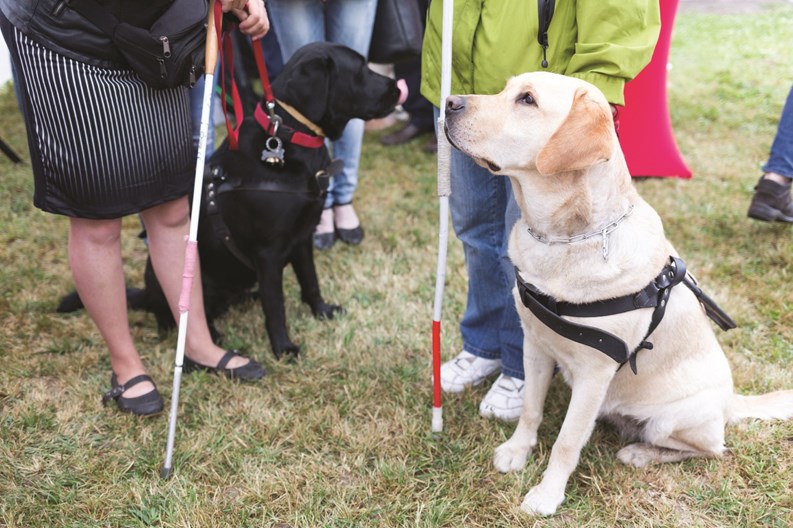There are few people as passionate as pet owners, and for evidence look no further than condo and co-op communities. The many health and aesthetic concerns that go with pets compel many boards to favor a ban on pets altogether. However, if the board succeeds in implementing a no-pet rule, don’t expect everyone to follow it. Across the country, many residents are exploiting well-intentioned laws designed to protect those with special needs in order to keep their pets.
Through the Americans with Disabilities Act, federal law provides for exceptions to pet bans in the case of those who can demonstrate a need for a service dog and what’s called an “emotional support animal.” According to the Judge Bazelon Center for Mental Health Law, co-op and condo boards, in addition to landlords, must make reasonable accommodation for any and all disabled individuals.
“Very few laws have been abused as far as the reasonable accommodation statute,” says Attorney Adam Leitman Bailey, founding partner of the law firm of Adam Leitman Bailey, P.C. in New York City. “I would say most of the service dogs requested do not come from people who are disabled or people who have a disability that require a service dog,” says Bailey.
The idea that most service animals are not actual service animals is stunning, but it’s difficult to prove with data. The federal government does not keep track of all service animals, and there are several organizations that have set up their own individual registrations. “Between the online websites that sell certificates, tags, vests, etc., and the medical providers that advertise to write letters for a one-time fee and after a one-time consult by phone or taking an online test where they provide the answers, the abuse is difficult to control.”
There are a lot of websites that will provide people with badges and vests for their animals indicating that they are service animals for a price (around $70), but those registries are all independent and unregulated. There are no official registries for service animals. The only documentation that indicates if a service animal is legitimate or not is a doctor’s note.
“We do not accept the tags and certificates or the letters that we can establish are from registries—like the National Service Animal Registry—or the medical providers that advertise,” says JoAnn Nesta Burnett, a senior attorney with the law firm of Becker & Poliakoff in Fort Lauderdale, Florida. There is no official registry for either emotional support animals or service animals.
Florida, in an attempt to combat the issue, passed a law in June of 2015 that makes it a misdemeanor to pass off an unqualified pet as a service animal. The law states that offenders can face up to 60 days in jail and a $500 fine. Catching perpetrators is easier said than done since the only questions that can be asked are, “Is this a service animal and if so what is it trained to do?” It also makes it a second-degree misdemeanor for business owners to prevent a disabled person from bringing their service animal inside. Other states are currently looking at similar laws.
According to the Bazelon Center, the Fair Housing Act states that so long as the person has a doctor’s note stating that they need the service dog, they must be accommodated. They do not need to disclose what disability they have or their medical history.
“In a purely residential community, with no short-term stays, the association can request reliable documentation from the requesting party’s medical provider (which may include physicians, social workers, therapists, etc.), in the form of a medical statement, that explains that the requesting party suffers from a physical or mental impairment that substantially impairs at least one major life activity and an explanation of how the animal ameliorates the effects of the disability,” says Burnett. “The association may also ask for the author’s credentials/license number, and is not entitled to medical records or to seek information beyond this. The association is not entitled to a specific diagnosis and should not ask for one. Dates of treatment should likewise not be requested.”
Register for a Fee
Of course, just like with the websites promising to “officially” register service animals for a one-time fee, there are similar websites that will provide people with a doctor’s note for a service animal after a fee and a very simple talk with a social worker or psychiatrist.
In 2014, the New Yorker ran an article in which a writer sought out one of these services and was able to get a doctor’s note for a snake named Augustus which she proceeded to take across New York City. The process she went through consisted of a short conversation with a therapist over the phone that consisted of only a few easy questions and ended with said doctor’s note arriving in an email the very next day.
As mentioned earlier there are limits to what you can and cannot ask. Residents do not have to provide the building with their medical records or what their specific disability is, but that doesn’t mean that the building is powerless in fighting fake service animal requests.
Under New York City Law
Who oversees such requests and rules on whether they are legitimate differs by municipality and region. In New York City, usually the Department of Mental Health and Hygiene, keeps track of service dog requests, according to Attorney Dennis H. Greenstein, a partner with the Manhattan-based law firm of Seyfarth Shaw LLP.
“Tenants who have a bona fide need to have a pet for assistance, comfort or emotional support may lawfully keep their pets in no-pet buildings,” Greenstein says. “In order to qualify for such accommodation,” he says, “a tenant must have a qualifying handicap under the Federal Fair Housing Act (the Act) or disability under the Americans with Disabilities Act (ADA) (both terms have the same legal meaning), or the Human Rights Law of New York State (NYS Human Rights Law) or New York City Civil Rights Law (NYC Civil Rights Law).
“The Act defines a person with a handicap as (1) individuals with a physical or mental impairment that substantially limits one or more major life activities; (2) individuals who are regarded as having such an impairment; and (3) individuals with a record of such an impairment,” he says. The term “physical or mental impairment” includes, but is not limited to, such diseases and conditions as orthopedic, visual, speech and hearing impairments, cerebral palsy, autism, epilepsy, muscular dystrophy, multiple sclerosis, cancer, heart disease, diabetes, Human Immunodeficiency Virus infection, mental retardation, emotional illness, drug addiction (other than addiction caused by current, illegal use of a controlled substance) and alcoholism.
“In New York City, in order to obtain a Service Dog (as defined below), an individual must provide documentation of a disability or need for an accommodation from a doctor or other licensed professional providing psychotherapy pursuant to the Act or NYC Civil Rights Law to the New York City Department of Health and Mental Hygiene. Those granted permission to own Service Dogs are required to further register their dogs as Service Dogs. Service dogs in New York City are issued a special cross-shaped brass tag to identify that the dog has been registered as a Service Dog by the New York City Department of Health and Mental Hygiene (DOHMH). However, a disabled person accompanied by a service dog is not required to show proof that they either have a disability or that the animal accompanying them is trained as a service animal.
“More specifically, on March 15, 2011, the U.S. Department of Justice issued revised regulations regarding the Service Dog Law,” according to Greenstein. Under the revised regulations, the ADA now defines “service animal” as “any dog that is individually trained to do work or perform tasks for the benefit of an individual with a disability, including a physical, sensory, psychiatric, intellectual, or other mental disability. Other species of animals, whether wild or domestic, trained or untrained, are not service animals for the purposes of this definition.”
Additionally, Greenstein notes, the ADA’s revised regulations maintained the Department of Justice’s position that companion dogs and emotional support animals are not included in the definition of “service animal.” The difference between a “companion dog” and “emotional support animal” from a “psychiatric service animal” is the work or tasks that the animal performs including but not limited to guiding people who are blind, alerting people who are deaf, pulling a wheelchair, alerting and protecting a person who is having a seizure, reminding a person with mental illness to take prescribed medications, or calming a person with Post Traumatic Stress Disorder (PTSD) during an anxiety attack. The revised ruling states, “the provision of emotional support, well-being, comfort, or companionship… does not constitute work or tasks for the purposes of this definition.”
“Note, however, that the ADA’s revised regulations, do not have any effect on the extent to which accommodations are required under other Federal statutes, like the Act, or NYS Human Rights Law or NYC Civil Rights Law. Under these laws, an individual with a disability may have the right to have an animal other than a dog in his or her home if the animal qualifies as a “reasonable accommodation” that is necessary to afford the individual equal opportunity to use and enjoy a dwelling, assuming that the use of the animal does not pose a direct threat. In some cases, the Act may conflict with state or local laws that prohibit individuals, with or without disabilities, from owning a particular species. Under these circumstances, an individual challenging the law must do so under the Act, not the ADA.
“In New York City, for a tenant to keep a “comfort pet” or “emotional support animal” in a no-pet building, the tenant must provide evidence that he or she has a disability which impedes the use and enjoyment of their apartment,” Greenstein says. Additionally, the tenant must also identify a fact-specific connection between their disability and the “comfort pet” or “emotional support animal.” Evidence of the tenant’s need for a “comfort pet” or “emotional support animal” can be provided by a doctor or other licensed professional providing psychotherapy. The case law suggests that the documentation contain objective medical findings, rather than being merely limited to opinion.
“Lastly, “ Greenstein says, “it is reasonable to have a tenant possessing a Service Dog, “comfort pet,” or “emotional support animal” adhere to the rules and regulations of the building concerning the behavior of the animal provided such rules do not limit the function of the animal in connection with the owner’s disability. Examples of such rules and regulations are leashing the animal, permitted access areas and elevators and being responsible for any damages created by the animal or restricting aggressive and unsafe behavior. Finally, neither the reasonable accommodation laws nor the New York City Pet Law protect animals deemed to be a nuisance.”
Do Your Due Diligence
“Once they open it up and claim a disability as a result of their dog, in my book it’s no holds barred,” claims Bailey. “You have a right to investigate to see if the service dog is necessary or is it a ploy to get a dog in a building that doesn’t allow pets. So at this point we are doing a fair due diligence investigation to determine if the service dog is actually necessary. If it’s close we will let the dog in, if they got a registration in the mail or aren’t willing to give us a doctor’s note then we have enough evidence at the time so we can deny entry and win the case if they sue,” says Bailey.
During this process, more often than not, if an irregularity is found and it turns out the animal may not be a legitimate service animal the person may well drop the request.
“I run searches on all the medical providers and the requesting parties to see what I can find. I have made familial connections and found things on Facebook that contradict what is said in the medical statement. In those cases, I usually ask for clarification and many times the request is dropped. But we are really limited,” notes Burnett.
None of this is to say that there are not legitimate cases of people needing service animals to help them with disabilities ranging from blindness to PTSD. Often those with legitimate disabilities dislike the people who get fake documentation for their animals more than the buildings dealing with the issue themselves. But when it comes down to it, this law, which is designed to help people, is routinely exploited. Unfortunately, there’s only so much anyone can do about it.
John Zurz is a staff writer for The Cooperator.










Comments
Leave a Comment